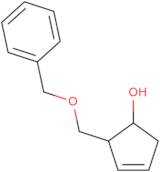(1R,2S)-2-(Benzyloxy)methyl-3-cyclopenten-1-ol
CAS : 188399-48-6
Ref. 3D-NHA39948
| 25mg | Arrêté | ||
| 50mg | Arrêté | ||
| 100mg | Arrêté | ||
| 250mg | Arrêté | ||
| 500mg | Arrêté |
Informations sur le produit
- (1R,2S)-2-[(Phenylmethoxy)methyl]-3-cyclopenten-1-ol
- (1S,2R)-2-((4-methylbenzyloxy)methyl)cyclopent-3-enol
- (1S,2R)-2-(BenzyloxyMethyl)cyclopent-3-enol
- (1S,2R)-2-(Benzyloxymethyl)-1-hydroxy-3-cyclopentene
- (1S,2R)-2-[(Phenylmethoxy)methyl]-3-cyclopenten-1-ol
- (1S,2R)-2-[(benzyloxy)methyl]cyclopent-3-en-1-ol
- 3-Cyclopenten-1-il,2-[(phenylmethoxy)methyl]-,(1R-trans)
- 3-Cyclopenten-1-ol, 2-[(phenylmethoxy)methyl]-, (1R,2S)-
- 3-Cyclopenten-1-ol, 2-[(phenylmethoxy)methyl]-, (1R-trans)-
- Entecavir inter-7
- Voir d'autres synonymes
- Entecavir intermediate 1
- Entecavir intermediate N1
- Intermediate of Entecavir 1
(1R,2S)-2-(Benzyloxy)methyl-3-cyclopenten-1-ol is a synthetic nucleoside analogue that has antiviral activity. It has been shown to be effective against cytomegalovirus (CMV), herpes simplex virus type 1 and 2 (HSV-1 and HSV-2), and hepatitis C virus (HCV). The triphosphate form of the drug is hydrolyzed by cellular enzymes to give deoxyribonucleosides, which are incorporated into DNA or RNA. The incorporation of these deoxyribonucleosides into DNA or RNA results in inhibition of viral replication by preventing the synthesis of viral DNA or RNA. This drug also inhibits the production of dideoxyribonucleosides, which are needed for DNA replication.
The analogues were synthesized using a stereospecific synthesis method that allows for the selective incorporation of either L- or D-nucleob





